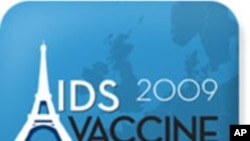Upstream science was featured Wednesday at the Paris AIDS vaccine conference. After Tuesday's review of the modest positive results of the recent Thailand AIDS vaccine trials, scientists heard about research to improve the chance of finding a much more effective vaccine.
Mitchell Warren, head of AVAC, the AIDS Vaccine Advocacy Coalition, says the concept of upstream science, once called basic research, goes back a few years.
"In 2004 or so, there was a pretty broad recognition in the AIDS vaccine field that…there was still a need to develop better vaccines. And that to develop those there were some big scientific questions that needed to be addressed."
That recognition, he says, led to greater resources being put into basic and preclinical science, or upstream science, "that wasn't around vaccine candidates per se at the time, but again focusing on some of these big scientific questions about how the virus worked, about the structure of the virus."
Lots of interesting and new approaches
<!-- IMAGE -->"Big programs, one called the Center for HIV Vaccine Immunology…and another, the Gates Foundation, funded a collaboration for AIDS vaccine discovery. And we're beginning to see the beginnings of the fruits of lots of labor," he says. "Those aren't vaccine candidates yet, buy they're really helping to develop new approaches." he says.
In recent years, some researchers complained of a lack of basic scientific research. Instead, they said, there was an emphasis on trying to make big discoveries.
Warren says, "I actually think there has been a fascinating shift in nomenclature…in the field right now. And historically, we've talked about basic science leading into preclinical development, leading into clinical trials. And that's one way to slice and dice the vaccine development process."
But things have changed in recent years, due in part to the unsuccessful Merck vaccine trial and the modestly successful Thai vaccine trial.
"What we're seeing is an approach that doesn't say basic, preclinical, clinical – but rather vaccine discovery and vaccine development. And we are seeing discovery efforts that historically were seen as basic science activities coming out of human clinical trials," he says.
Important message
"I think the most important message coming out is that while all different types of research are important with non-human primates, with laboratory research, HIV is a human disease. And the human is the best animal in which to discover things about HIV and things about how to make a vaccine better," he says.
Human clinical trials are delivering some important basic science information, he adds.
"I think we will, over the coming months and years, see a really interesting discussion taking place about how do we go forward in asking the best questions and answering them in the best possible experiment, whether it's seen as a laboratory experiment or a human clinical trial."
<!-- IMAGE -->







